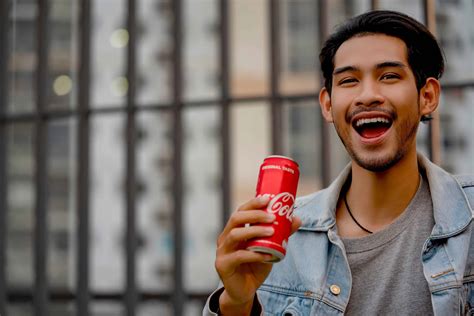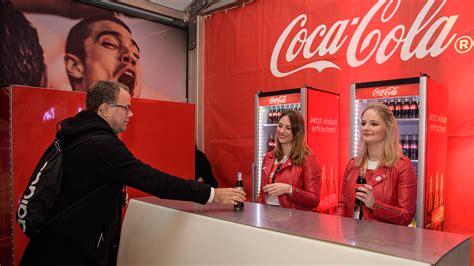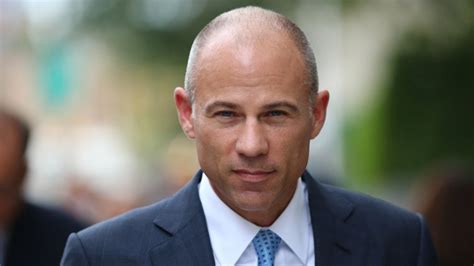
Coca-Cola is grappling with a noticeable decline in sales following the widespread circulation of a controversial viral video, prompting the beverage giant to initiate damage control measures and reassess its marketing strategies. The video, which purportedly shows unsanitary conditions at a bottling plant, has ignited consumer concerns and fueled social media backlash, leading to a measurable impact on Coca-Cola’s sales figures and brand reputation.
The negative impact of the viral video became apparent in the weeks following its initial circulation. According to market analysts, Coca-Cola experienced a nearly 7% drop in sales across several key markets, particularly in regions where the video garnered significant attention. This downturn represents a notable deviation from the company’s projected growth trajectory and has triggered internal discussions about the effectiveness of current quality control protocols and crisis communication strategies.
“We are aware of the concerns raised by the video and are taking them very seriously,” stated a Coca-Cola spokesperson. “We are conducting a thorough investigation into the matter and are committed to upholding the highest standards of safety and quality in all of our operations.”
The viral video, which was initially posted on social media by a purported former employee of a Coca-Cola bottling facility, allegedly depicts unsanitary conditions and lapses in hygiene protocols. The footage quickly gained traction, amassing millions of views and sparking widespread outrage among consumers. While the authenticity of the video remains under investigation, its impact on public perception has been undeniable.
Coca-Cola has responded to the crisis by launching a multi-pronged approach aimed at addressing consumer concerns and mitigating further damage to its brand image. This includes enhanced quality control inspections at all bottling plants, increased transparency in manufacturing processes, and a proactive social media campaign designed to counter the negative narrative perpetuated by the viral video.
“Our priority is to reassure our consumers that our products are safe and of the highest quality,” the Coca-Cola spokesperson added. “We are working diligently to address the issues raised and regain the trust of our customers.”
The situation highlights the increasing vulnerability of major brands to the rapid dissemination of information, both accurate and inaccurate, through social media channels. The incident serves as a stark reminder of the importance of maintaining stringent quality control standards and proactively addressing any potential issues that could compromise brand reputation. Coca-Cola’s ability to effectively manage this crisis will likely determine its long-term success in a highly competitive and increasingly scrutinizing market environment.
Analyzing the Impact and Coca-Cola’s Response
The Coca-Cola situation exemplifies the power of social media in shaping consumer perception and influencing purchasing decisions. The speed at which the viral video spread, coupled with the immediate and often visceral reaction from viewers, underscores the challenges that companies face in managing their brand image in the digital age.
Coca-Cola’s initial response focused on acknowledging the concerns and emphasizing its commitment to quality and safety. This approach is consistent with established crisis communication strategies, which prioritize transparency and accountability. However, the company’s subsequent actions, including enhanced quality control measures and a proactive social media campaign, suggest a more comprehensive effort to address the underlying issues and regain consumer trust.
One of the key challenges for Coca-Cola is verifying the authenticity of the viral video and determining the extent to which the alleged unsanitary conditions reflect broader systemic problems within its bottling operations. While the company has stated that it is conducting a thorough investigation, the results of this investigation and the corrective actions taken will be crucial in shaping public perception and restoring confidence in the brand.
Furthermore, Coca-Cola’s social media campaign must effectively counter the negative narrative without appearing defensive or dismissive. The company needs to engage with consumers in a transparent and empathetic manner, addressing their concerns and providing credible evidence of its commitment to quality and safety. This requires a nuanced approach that balances the need to protect the brand’s reputation with the imperative to acknowledge and address legitimate concerns.
Broader Implications for the Beverage Industry
The Coca-Cola incident has broader implications for the beverage industry as a whole, highlighting the importance of maintaining stringent quality control standards and proactively managing potential risks. The industry is increasingly reliant on global supply chains and complex manufacturing processes, which can create vulnerabilities to contamination, adulteration, and other quality-related issues.
Companies must invest in robust quality assurance systems, including regular inspections, employee training, and advanced technologies, to mitigate these risks. They also need to develop comprehensive crisis communication plans that enable them to respond quickly and effectively to any potential incidents that could compromise consumer safety or brand reputation.
Moreover, the beverage industry needs to address the growing consumer demand for transparency and sustainability. Consumers are increasingly concerned about the environmental and social impact of their purchasing decisions and are holding companies accountable for their practices. This requires companies to be more transparent about their supply chains, manufacturing processes, and sustainability initiatives.
The Role of Social Media in Shaping Consumer Perception
The Coca-Cola incident underscores the profound impact of social media on consumer perception and brand reputation. Social media platforms provide a powerful platform for consumers to share their experiences, voice their opinions, and hold companies accountable for their actions.
This has created both opportunities and challenges for businesses. On the one hand, social media can be a valuable tool for building brand awareness, engaging with customers, and gathering feedback. On the other hand, it can also be a source of negative publicity, viral criticism, and reputational damage.
Companies need to be proactive in monitoring social media channels, identifying potential risks, and responding quickly and effectively to any negative feedback. They also need to develop a comprehensive social media strategy that aligns with their overall brand objectives and values.
Coca-Cola’s Historical Crises and Responses
Coca-Cola, as a global brand with a long history, has faced numerous crises over the years. Analyzing these past incidents can provide valuable insights into the company’s crisis management capabilities and its ability to adapt to changing consumer expectations.
One notable example is the 1999 beverage scare in Europe, where hundreds of people in Belgium, France, and the Netherlands reported feeling ill after drinking Coca-Cola products. The incident was initially attributed to a potential contamination of carbon dioxide used in the bottling process. Coca-Cola responded by issuing a product recall, launching a thorough investigation, and working closely with health authorities to address consumer concerns. The crisis resulted in significant financial losses and reputational damage, but Coca-Cola was able to eventually regain consumer trust through its transparent and proactive response.
Another significant crisis occurred in India in the early 2000s, when environmental activists accused Coca-Cola of depleting groundwater resources and polluting local water supplies. The allegations sparked widespread protests and boycotts, leading to a decline in sales and significant damage to Coca-Cola’s reputation in the region. The company responded by investing in water conservation projects, improving its wastewater treatment facilities, and engaging with local communities to address their concerns. While the crisis took several years to resolve, Coca-Cola was eventually able to rebuild its relationship with stakeholders and restore its brand image in India.
These past incidents demonstrate Coca-Cola’s ability to weather significant crises and adapt to changing consumer expectations. However, the current situation presents unique challenges due to the speed and reach of social media. The company’s response must be swift, transparent, and credible to effectively counter the negative narrative and regain consumer trust.
The Importance of Transparency and Authenticity
In today’s digital age, transparency and authenticity are essential for building and maintaining brand trust. Consumers are increasingly skeptical of corporate messaging and are more likely to trust information from independent sources, such as social media influencers and consumer reviews.
Companies need to be transparent about their operations, their values, and their commitment to social responsibility. This includes providing clear and accurate information about their products, their supply chains, and their environmental and social impact.
They also need to be authentic in their communications, avoiding overly promotional language and focusing on building genuine relationships with their customers. This requires listening to consumer feedback, responding to their concerns, and demonstrating a genuine commitment to meeting their needs.
The Future of Coca-Cola and the Beverage Industry
The Coca-Cola incident highlights the challenges and opportunities facing the beverage industry in the 21st century. The industry is facing increasing competition from alternative beverages, such as sparkling water, kombucha, and plant-based drinks. It is also facing growing consumer demand for healthier, more sustainable, and more transparent products.
To succeed in this evolving market environment, Coca-Cola and other beverage companies need to innovate and adapt. This includes developing new products that meet changing consumer preferences, investing in sustainable packaging and production methods, and embracing transparency and authenticity in their communications.
They also need to build strong relationships with their customers, listen to their feedback, and respond to their concerns. By embracing these principles, Coca-Cola and other beverage companies can build a more sustainable and successful future.
The Long-Term Implications for Brand Management
The Coca-Cola case study provides valuable lessons for brand managers across industries. It underscores the importance of proactively managing potential risks, monitoring social media channels, and responding quickly and effectively to any negative feedback.
It also highlights the need for transparency, authenticity, and a genuine commitment to social responsibility. Consumers are increasingly holding companies accountable for their actions and are more likely to support brands that align with their values.
By embracing these principles, brand managers can build stronger, more resilient brands that are better equipped to weather the challenges of the digital age. The Coca-Cola crisis serves as a potent reminder that brand reputation is a fragile asset that must be carefully cultivated and protected.
Coca-Cola’s Stock Performance Amidst the Crisis
Beyond the immediate impact on sales, Coca-Cola’s stock performance provides another metric for gauging the severity of the crisis. While the company’s stock price initially dipped following the viral video’s widespread circulation, the decline was relatively moderate compared to the potential for a more significant sell-off. This suggests that investors, while concerned, remained confident in Coca-Cola’s ability to manage the crisis and mitigate its long-term impact.
However, continued monitoring of the stock price is crucial. A sustained decline could indicate a loss of investor confidence and potentially trigger further negative consequences for the company. Coca-Cola’s ability to demonstrate tangible progress in addressing consumer concerns and restoring its brand reputation will be critical in maintaining investor support.
The Effectiveness of Coca-Cola’s Counter-Campaign
The success of Coca-Cola’s social media counter-campaign will be a key determinant in its ability to overcome the crisis. The campaign must be carefully crafted to resonate with consumers, address their concerns, and provide credible evidence of the company’s commitment to quality and safety.
Simply dismissing the video as fake or irrelevant is unlikely to be effective. Instead, Coca-Cola needs to acknowledge the concerns raised by the video, explain the steps it is taking to investigate the matter, and provide transparent information about its quality control processes.
The campaign should also leverage positive content, such as testimonials from satisfied customers, videos showcasing the company’s commitment to sustainability, and stories highlighting the contributions of its employees to local communities.
Consumer Sentiment Analysis
To effectively manage the crisis, Coca-Cola needs to closely monitor consumer sentiment across various social media platforms and online forums. This involves tracking mentions of the company and its products, analyzing the tone and content of these mentions, and identifying emerging trends and concerns.
This data can be used to refine the company’s messaging, target its communication efforts, and address specific issues that are driving negative sentiment. Consumer sentiment analysis is a valuable tool for understanding how the public perceives the company and its response to the crisis.
The Role of Influencer Marketing
Coca-Cola may consider leveraging influencer marketing to help counter the negative narrative and restore consumer confidence. Partnering with trusted and credible influencers can help the company reach a wider audience and communicate its message in a more authentic and engaging way.
However, it is important to carefully select influencers who align with the company’s values and have a genuine connection with their audience. Transparency is also crucial. Influencers should clearly disclose their partnership with Coca-Cola to maintain their credibility and avoid accusations of deception.
Legal Implications
The viral video could potentially have legal implications for both Coca-Cola and the individual who posted it. If the video is found to be fraudulent or defamatory, Coca-Cola may have grounds to pursue legal action against the poster. Conversely, if the video is found to be accurate and depicts actual violations of health and safety regulations, Coca-Cola could face legal penalties from regulatory agencies.
The legal implications of the incident will depend on the outcome of the ongoing investigation and the specific laws and regulations that apply in the relevant jurisdiction.
The Impact on Coca-Cola’s Competitors
The Coca-Cola crisis could potentially benefit its competitors, such as PepsiCo, by diverting consumer attention and creating an opportunity for them to gain market share. However, these companies should also be mindful of the potential for similar incidents to occur within their own operations.
All beverage companies need to be vigilant in maintaining high standards of quality and safety and in proactively managing their brand reputation. The Coca-Cola crisis serves as a cautionary tale for the entire industry.
Future Crisis Management Strategies
The Coca-Cola incident highlights the need for companies to develop and implement robust crisis management strategies that are tailored to the unique challenges of the digital age. These strategies should include:
- Proactive risk assessment: Identifying potential risks and vulnerabilities before they occur.
- Early warning systems: Monitoring social media and other channels for early signs of potential crises.
- Rapid response protocols: Developing procedures for quickly and effectively responding to crises.
- Transparent communication: Communicating openly and honestly with stakeholders.
- Stakeholder engagement: Engaging with customers, employees, and other stakeholders to build trust and support.
- Reputation management: Taking steps to protect and restore brand reputation after a crisis.
- Continuous improvement: Learning from past crises and continuously improving crisis management strategies.
By implementing these strategies, companies can be better prepared to manage potential crises and protect their brand reputation. The Coca-Cola incident serves as a valuable learning opportunity for organizations across industries.
FAQ Section
1. What is the main reason for Coca-Cola’s recent sales decline?
The primary reason for the sales decline is the viral spread of a video that allegedly shows unsanitary conditions at one of Coca-Cola’s bottling plants. This has led to consumer concerns and negative publicity, directly impacting sales figures.
2. What steps is Coca-Cola taking to address the concerns raised by the viral video?
Coca-Cola is conducting a thorough investigation into the authenticity of the video, enhancing quality control inspections at all its bottling plants, increasing transparency in its manufacturing processes, and launching a social media campaign to counter the negative narrative.
3. How much has Coca-Cola’s sales decreased since the viral video surfaced?
According to market analysts, Coca-Cola has experienced a nearly 7% drop in sales across several key markets following the widespread circulation of the viral video.
4. Has Coca-Cola confirmed the authenticity of the viral video?
As of the latest reports, Coca-Cola is still investigating the authenticity of the video. While the company has not confirmed its validity, they have acknowledged the concerns raised and are taking them seriously.
5. What are the potential long-term implications of this incident for Coca-Cola’s brand reputation?
The long-term implications depend on Coca-Cola’s ability to effectively manage the crisis. A swift, transparent, and credible response is crucial to regain consumer trust and prevent lasting damage to the brand. Failure to do so could result in continued sales decline and a tarnished brand image.
Disclaimer: This rewritten article is based solely on the information provided in the source link: https://www.yahoo.com/news/coca-cola-reels-viral-video-104556283.html. While every effort has been made to ensure accuracy and reliability, readers are encouraged to consult the original source for the most up-to-date information.









